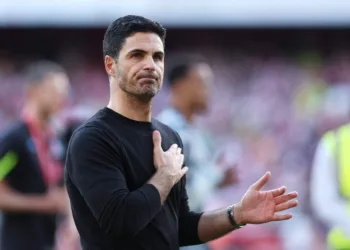Arsene Wenger, a name that resonates deeply in the world of football, has always been regarded as a man of unwavering principles and commitment. During his remarkable 22-year stint as Arsenal’s coach, Wenger faced multiple temptations from football giants, including Real Madrid, who came knocking at his door not once, but thrice. This revelation unveils the reasons behind his audacious decision to defy the allure of one of the world’s most prestigious clubs.

Wenger’s Arsenal journey, spanning from September 1996 to 2018, was nothing short of legendary. He etched his name in history by clinching four Premier League titles and seven FA Cups, establishing himself as the most decorated manager in Arsenal’s illustrious history. However, the real intrigue lies in the story of his steadfast loyalty to Arsenal and the rare act of turning down Real Madrid, not once, not twice, but three times.
Wenger’s Deep-Rooted Admiration for Real Madrid
Arsene Wenger’s admiration for Real Madrid was no secret. He openly acknowledged his childhood fondness for the club, the Estadio Santiago Bernabeu, and the city itself. The stadium’s central location, nestled in the heart of the city, resonated with him on a profound level. He saw it as an integral part of people’s lives and emphasized the extraordinary significance of football as the lifeblood of the city. “I love seeing that the stadium is in the heart of the city, it’s part of people’s lives,” Wenger once told EFE. “Football is at the heart of the city. That’s Real Madrid, and that’s the Santiago Bernabeu.”
Wenger’s deep-rooted admiration for Real Madrid made the club’s offers all the more enticing. The allure of managing a club he had adored since his youth was a dream come true, but as history would reveal, it was a dream he repeatedly declined.

Read More: Arsene Wenger predicted the formation of the European Super League nearly 12 years ago
Wenger’s Commitment to Arsenal’s Ambitious Project
One of the most significant reasons behind Wenger’s rejection of Real Madrid lay in his unshakable commitment to Arsenal’s ambitious project. During his tenure, the club embarked on a monumental endeavor – the construction of a new stadium to replace Highbury. What set this project apart was that it was entirely self-financed. Arsenal paid for it on their own, relying on player sales and strategic signings to fund the construction.
Wenger played a pivotal role in this project, and his loyalty and dedication were unwavering. He prioritized Arsenal’s long-term vision over the immediate glory that managing Real Madrid could offer. In his own words, “I didn’t look for immediate glory, I went for something deeper. In this life, you can only do what you think is right. It’s my character, I don’t know if I chose well, but I did what I wanted.”
Real Madrid’s Unpredictable Coaching Carousel
While Wenger’s rejection of Real Madrid might be perplexing to some, a closer look at Real Madrid’s history of frequently changing managers provides a clearer understanding. During Wenger’s time at Arsenal, Real Madrid saw as many as 19 different coaches take charge of the team. The club’s reputation for having less patience with their coaches and the reduced level of autonomy Wenger would have experienced compared to his position in England were significant factors that led to his ultimate rejection of the offer.

The need for more guarantees and Wenger’s sense of loyalty and indebtedness to Arsenal played a pivotal role in his decision. He chose to stay true to the project he had committed to and successfully achieved – the completion of Arsenal’s new stadium.
Arsene Wenger’s Reflective Musings
In the world of football, where the pursuit of immediate success often takes precedence, Wenger’s decisions stood out as a testament to his values and principles. Even after turning down the prestigious offers, Wenger occasionally contemplates whether he made the right choice. However, he remains steadfast in his belief that he was in the right place at the right time, leading Arsenal to a new era while maintaining his integrity and commitment.

Arsene Wenger’s rejection of Real Madrid, not once, not twice, but three times, is a story that encapsulates the values of loyalty, commitment, and a steadfast dedication to a long-term vision. His decision to prioritize Arsenal’s ambitious project over immediate glory at one of the world’s most prestigious clubs remains a remarkable chapter in the history of football management. Wenger’s legacy extends far beyond the titles he won; it’s a legacy of unwavering principles and values that have left an indelible mark on the footballing world.








